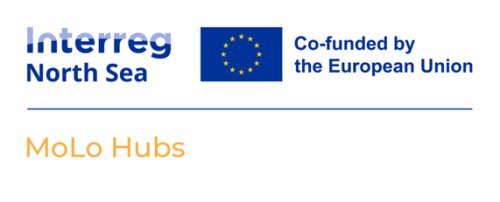
Summary
MoLo Hubs goes beyond existing mobility hub projects. It aims to reduce urban traffic by initiating and prototypically implementing new and convenient logistics service offers at urban mobility hubs. Five pilots will make an important contribution to reduce urban traffic, increase the attractiveness and functionality of urban mobility hubs and also give an insight into how user-centred logistics services can be designed.
The Challenge
Today, 70% of the EU population is living in cities and urban areas. In 2050, 83% of this population will live in cities. This will lead to further demand for mobility services, well organized city logistics processes and urban commercial transports. At the same time, end consumers demand for convenient urban services will grow. In order to reach the European Green Deal target of reducing greenhouse gas emissions by 90 % by 2050, city logistics processes and services need to be re-thought.
With increased urbanization the North Sea Region encounters many issues related to transportation, such as increased noise and air pollution, traffic congestion, high parking pressure and accident costs. Shared mobility can foster mobility transition and has the potential of becoming one of the pillars of a sustainable urban mobility system. It increases the use and efficiency of transportation assets, supports the shift towards sustainable modes of transport and reduces car-dependency.
But in order to activate the potential of shared mobility hubs, their convenience and functions need to be expanded. At the same time, induced transports for last mile logistics operations need to be reduced. Combining innovative logistics services (supply & return flows) with shared mobility hubs creates strong synergies. Increasing attractiveness of mobility hubs for their users and decreasing commercial urban transports at the same time enables car-free districts in city development.
Project content and goals
MoLo Hubs strongly focusses on the initiation and implementation of new logistics services integrated into mobility hubs, in order to reduce commercial traffic in urban areas induced by logistics operations and at the same time increase the functionalities and convenience of mobility hubs for users and through this increase their use and attractiveness. Therefore, MoLo Hubs not only creates a shift of traffic to green and active modes of transport, but also new and innovative urban value chains. These are being implemented in 5 regions and are tackling all aspects of a typical product life cycle (distribute - repair -dispose) by conducting pilots for all stages of such product life cycles. By combining logistics services with mobility hubs, users are given an incentive to use and frequent mobility hubs more often. This will lead to a decrease in traffic congestion, reduced GHG emissions and optimised accessibility and use of public space, all representing current territorial challenges for urban mobility in cities and regions along the North Sea Region.
In addition, digital solutions will be used in individual pilots, allowing users smart and easy access to new logistics services. The project's USP will be the strong focus on people-centricity. Involvement of the user needs from the very beginning, the incorporation of smart spatial planning and city design aspects and social aspects will support acceptance and prospects of success for the piloted solutions throughout the project lifetime and beyond.
MoLo Hubs defines itself as a "learning journey" along the implementation of the pilots. Some of the logistics services to be implemented are comparable, but involve different starting situations or local challenges, whose solutions can be benefits for all pilot regions or adapted in other ways.
Role of TPR
The geographical integration of services for passenger and freight transport has the potential to (i) improve the attractivity and hence popularity of the proposed solutions; (ii) support the business model of such shared transport hubs;(iii) increase the efficiency of urban land use and limit negative externalities; and (iv) fit within the idea of the 15-min city. Our role is to assess these impacts.
Project duration
July 1st, 2023 till December 31st, 2026
Project funding
This project receives funding from the Interreg North Sea Programme (https://www.interregnorthsea.eu/)
Project website
https://www.interregnorthsea.eu/molo-hubs